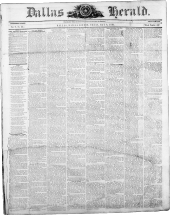July 1, 1863, Dallas Herald
Among the registered enemies of the United States government who have been recently sent across the lines from New Orleans, there is now in this city a lady whose adventures place her in the ranks of the Molly Pitchers of the present revolution.
At the breaking out of the war, Mrs. James J. Williams (the lady of whom we alluded) was a resident of Arkansas. Like most of the women of the South, her whole soul was enlisted for the struggle for independence. Her husband was a Northern man by birth and education and a strong Union man. After Arkansas seceded from the Union he went to Connecticut, he said, to see his relations and settle upon some business. Mrs. Williams suspected his purpose, and finally she received information that he had joined the Yankee army. Possessing little of the characteristic weakness of the sex, either in body or mind, Mrs. W. vowed to offer her life upon the altar of her country, disguising herself in a Confederate uniform, and adopting the name of Henry Benford, she proceeded to Texas where she raised and equipped an independent company and went to Virginia with it as first Lieutenant. She was in the battle of Leesburg and several skirmishes, but finally her sex having been discovered by the surgeon of the regiment–the 5th Texas Volunteers to which the company had been attached–she returned to her home in Arkansas. After remaining there a short time she proceeded to Corinth and was in the battle of Shiloh where she displayed great coolness and courage. She saw her father on the field but, of course, he did not recognize her, and she did not make herself known to him. In the second day’s fighting she was wounded in the head and was ordered to the rear. She wrote to her father and then came off down to Grenada where she waited for some time, but never saw or heard from him.
She then visited New Orleans, was taken sick and while sick the city was captured. On recovery she retired to the coast, where she employed herself in conveying communications, assisting parties to run the blockade with drugs and clothes and uniforms. She was informed on by a negro and arrested and brought before Gen. Butler. She made her appearance before Gen. B. in a Southern homespun dress. She refused to take the oath, told him she gloried in being a rebel–had fought side by side with Southern men for Southern rights, and if she ever lived to see “Dixie” she would do it again. Butler denounced her as the most incorrigible she-rebel he had ever met with. By order of the Beast she was placed in confinement, where she remained three months. Some time after her release, she was arrested again for carrying on “contraband correspondence,” and kept in a dungeon fourteen days on bread and water, at the expiration of which time she was placed in the State prison as a dangerous enemy. Her husband it so happened, was a lieutenant in the 13th Connecticut Regiment, and on duty as Provost Guard in the city. He accidentally found her out and asked if she wanted to see him. She sent him word she never wanted to see him as long as he wore the Yankee uniform. But he forced himself upon her, tried to persuade her to take the oath, get a release, when he said he would resign and take her to his relations in Connecticut. She indignantly spurned his proposition, and he left her to her fate. When General Banks resumed command, he released a great many prisoners, but kept her in confinement until the 17th of May last, when she was sent across the lines to Meadesville with the registered enemies.
An article was recently published in the New York World in relation to the part Mrs. Williams has played in this war, but the above is, we are assured, a true account of her remarkable career. We understand she has attached herself to the medical staff of a brigade now in this city, and will render all the assistance in her power to our wounded in the approaching struggle for possession of the great Valley of the Mississippi.
Jackson, Miss., June 6, 1863.
